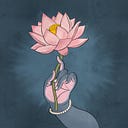The Creation of the Saptamātṛka and the Slaying of Raktabīja
From the Devi Mahātmya

Of the sons of Kaśyapa Prajāpati by his wife Diti (called the Daityas ), two of them became notorious asuras called Śumbha and Niśumbha. They were born and raised in Pātāla and as young men they came to earth and began rigorous tapas, consuming neither food nor drink. After ten thousand years Brahmā appeared and offered them both a boon. Śumbha and Niśumbha asked for eternal deathlessness but Brahmā refused to grant that boon, so they asked for a conditional death in a manner that would be impossible: “We shall not meet with death at the hands of males among Devas, human beings or by birds, animals etc. We should be killed only by women; we fear them not.” Brahmā granted them such a boon and they returned to Pātāla. Śukra was pleased and made Śumbha sit on a golden throne and crowned him King of Daityas. Following this, lesser Kings began coming to salute the great King and pay tributes. Great daityas like the Caṇḍamuṇḍas, Dhūmralocana, Raktabīja etc., became attendants of Śumbha and Niśumbha.
After having established the power of the daityas thus Śumbha — Niśumbha gradually turned their attention towards extending the boundaries of their kingdom. The whole earth they subjugated. Then Niśumbha with a large army marched to Devaloka to conquer Indra. A Devāsura war began. Caṇḍa and Muṇḍa usurped the kingdom of the devas, who in desperation, approached Devi Pārvati for help.


For the destruction of Śumbha and Niśumbha and other wicked daityas, Ambikā then appeared from the body of Gaurī, the benefactor of the gods, for the protection of the three worlds.
Therein begins the episode of the slaying of Raktabhīja and the creation of the Saptamātṛkā in The Devi Mahātmya:
After Caṇḍa was killed, Muṇḍa slain, and the vast armies annihilated, the lord of asuras burned with rage. His reason overcome, Śumbha ordered the marshaling of all the demon hosts:
‘Now let the daitya clans with all their troops go forth, the eighty-six Udāyudha and the eighty-four Kambu families, together with their forces.
Let the fifty Koṭivīrya families and the hundred Dhaumra clans depart at my command. So also at my command, let the Kālaka, Daurhṛda, Maurya, and Kālakeya asuras set out in haste, armed for battle.’
Seeing that most formidable army approach, Caṇḍikā filled the space between earth and sky with the resonance of her bowstring.
Thereupon her lion emitted a deafening roar, and Ambikā heightened the noise with her clanging bell. Kālī drowned out the din of bowstring, lion, and bell, filling every direction (signifying divine omnipresence) with terrifying howls from her gaping mouth.
Hearing the tumult, the enraged demon armies closed in on the Devī, her lion, and Kālī from all four sides. At that very moment, to ensure the well-being of the supreme Gods and to annihilate their adversaries, surpassingly brave and powerful śaktis, the gods’ embodied powers, sprang forth from the bodies of Brahmā, Śiva, Skanda, Viṣṇu, and Indra, mirroring the form of each. They approached Caṇḍikā.
Whatever that god’s form was, whatever his adornments and his mount, in that very form his śakti went forth to combat the asuras.

In a celestial chariot drawn by swans, Brahmā’s śakti came forth with prayer beads and waterpot in hand. She is called Brahmāṇī.
Māheśvarī arrived astride a bull, holding the finest trident, wearing great serpents for bracelets, and adorned with the crescent moon.
Ambikā, having the war god’s form and riding a fine peacock, came forth as Kaumārī with spear in hand to fight against the daityas.
Likewise the śakti Vaiṣṇavī, mounted on Garuda, approached holding conch, discus, mace, bow, and sword.
The śakti of Hari, who bears the unique form of the sacrificial boar, came forward as Vārāhī in that boarlike aspect.
Nārasiṃhī, resembling Viṣṇu’s embodiment as a man-lion, arrived there, scattering the constellations with the toss of her mane.
Thousand-eyed like Indra, and in like manner with thunderbolt in hand, Aindrī arrived riding on the lord of elephants.
Then Śiva, surrounded by those śaktis of the gods, said to Caṇḍikā, ‘Let the asuras quickly be slain for my satisfaction.’
Thereupon from the Devī’s body there issued forth Caṇḍikā’s own terrifying śakti, savage in her fury and howling like a hundred jackals.
And she, the unvanquished one, said to Śiva of dark, matted locks, ‘Go, my lord, as my messenger to Śumbha and Niśumbha.
Say to those two arrogant dānavas, Śumbha and Niśumbha, and to the other dānavas assembled there for battle:
“Indra must regain the three worlds, the gods must again enjoy the sacrificial oblations, and you must return to the nether world if you wish to live. But if through the conceit of strength you are desirous of battle, then come and let my jackals be satiated with your flesh!”’
Since the Devī appointed Śiva himself as messenger, she has come to be known in this world as Śivadūtī.
Hearing Śiva declare the Devī’s words, the great asuras were filled with indignation and went to where Kātyāyanī stood. At the outbreak of battle, the gods’ adversaries, arrogant in their anger, rained torrents of arrows, spears, and lances upon the Devī.
And she, with great arrows shot from her resounding bow, playfully split asunder their hurtling arrows, lances, spears, and axes.
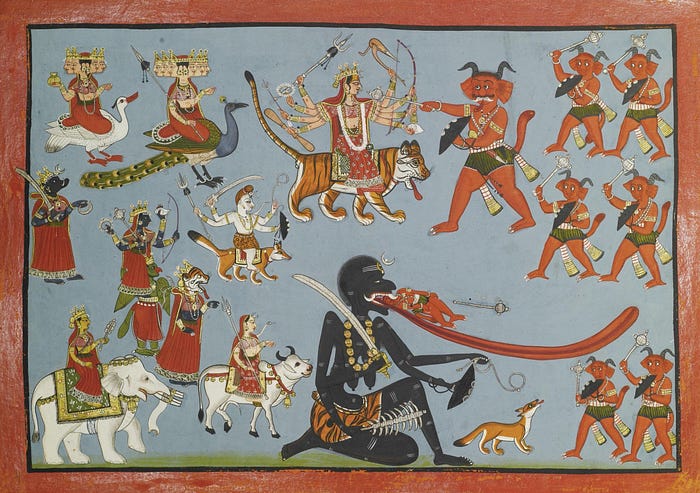
Kālī roamed about the battlefront, slashing her enemies to shreds with her spear and crushing them with her skull-topped staff.
Brahmāṇī, wherever she went, left her enemies sapped of strength, disabled by the holy water sprinkled from her waterpot.
Māheśvarī slew the daityas with her trident; so, too, did Vaiṣṇavī with her discus, Kaumārī with her spear, and the wrathful Aindrī with her thunderbolt. Daityas and dānavas, tom asunder, fell by the hundreds, discharging torrents of blood upon the earth.
They fell, scattered by blows from Vārāhī’s boarlike snout, pierced through the chest by her tusks, and ripped apart by her discus.
Nārasiṁhī, tearing other great asuras apart with her claws and devouring them, roamed about the battlefield, filling the sky with her roars.
Dazed by Śivadūtī’s violent laughter, the asuras fell to the ground, and she devoured those fallen ones.
When the enemy troops saw the enraged band of Mothers crushing the mighty asuras by diverse means, they fled. Seeing the remaining daityas flee, tormented thus by the band of Mothers, the great asura Raktabīja went forth in anger to do battle.
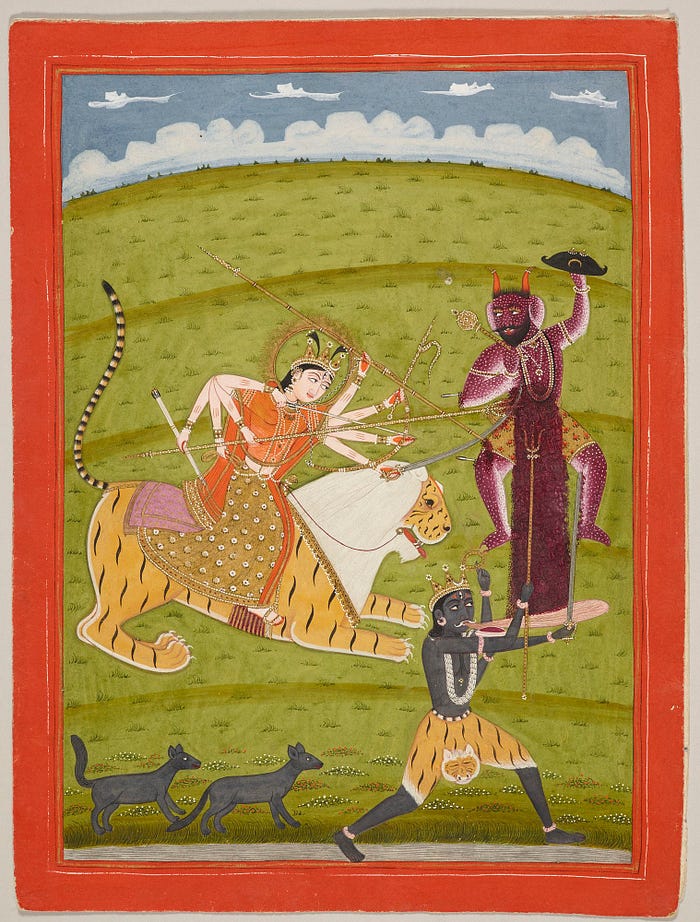
Whenever a drop of blood fell from his body to the ground, an asura of like measure would rise up from the earth.
With club in hand the great asura fought with Indra’s śakti. Then Aindrī struck Raktabīja with her thunderbolt.
Blood streamed in torrents from the stricken asura, and from that blood rose up warriors of identical form and might.
As many drops of blood fell from his body, so many beings of equal valor, strength, and courage arose, and those who sprang up from his blood battled there with the Mothers ever more fiercely, hurling the most formidable of weapons.
When the Devī’s thunderbolt struck Raktabīja’s head, blood flowed again, and from it asuras were born by the thousands.
In the combat Vaiṣṇavī attacked the lord of asuras with her discus, and Aindri beat him with her mace.
Blood flowed from the cuts of Vaiṣṇavī’s discus, and therefrom great asuras of equal measure arose by the thousands and filled the world.
Kaumārī with her spear, Vārāhī with her sword, and Māheśvarī with her trident struck the great asura Raktabīja, and he, the mighty, rage-filled daitya, struck all the Mothers one by one with his club.
Out of the blood that streamed upon the earth from the relentless wounds of spear, lance, and other weapons, asuras sprang up by the hundreds, and those demons born from this one demon’s flowing blood pervaded all the world.
Utter terror seized the gods.
Caṇḍikā burst into laughter at their despair and said to Kālī, ‘O Cāmuṇḍā, open wide your mouth and quickly drink in the drops of blood from my weapons’ blows and the great asuras born therefrom. Roam about on the battlefield and devour the great demons sprung from Raktabīja. So shall this daitya, drained of blood, go to his destruction. As you consume those fierce asuras, others shall not arise.’
Having spoken thus, the Devī attacked Raktabīja with her lance, while Kālī avidly lapped up his blood.
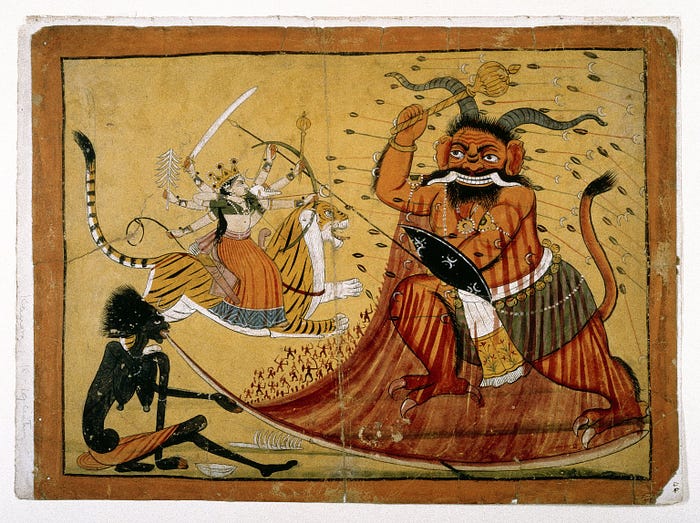
Raktabīja turned upon Caṇḍikā with his club, but his cudgel blows caused her not even the slightest pain. From his beaten body blood flowed copiously in every direction, and Cāmuṇḍā engulfed it with her mouth. And within her mouth those great asuras who sprang into being from the flow, those she now devoured, even while drinking Raktabīja’s blood.
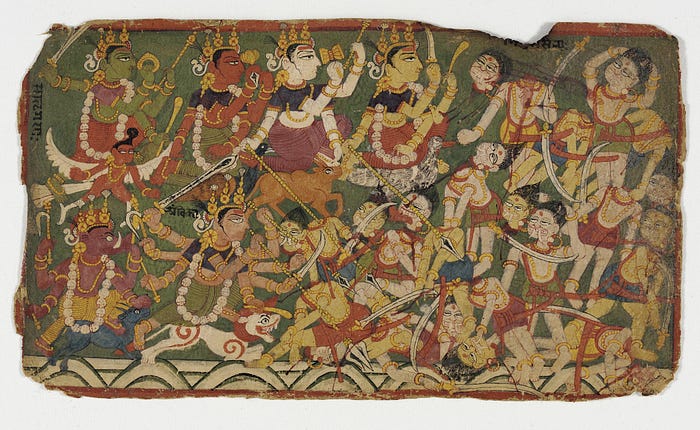
The Devī assailed Raktabīja with lance, thunderbolt, arrows, swords, and spears while Cāmuṇḍā drank his blood. Battered by that array of weapons and drained of blood, the great asura Raktabīja toppled to the ground. The Gods attained immeasurable joy, and the band of Mothers born from them danced about, intoxicated with blood.
References:
- In Praise of the Goddess: The Devīmāhātmya and Its Meaning by Devadatta Kālī
2. Purnaic Encylopedia by Vettam Mani
__________________________________________
If you find value in my work, I hope you consider becoming a patron or making a contribution via UPI to hindu.aesthetic@okicici. Hindu Aesthetic requires a lot of time and effort and your support would mean that I can continue bringing you the best possible content. ❤
